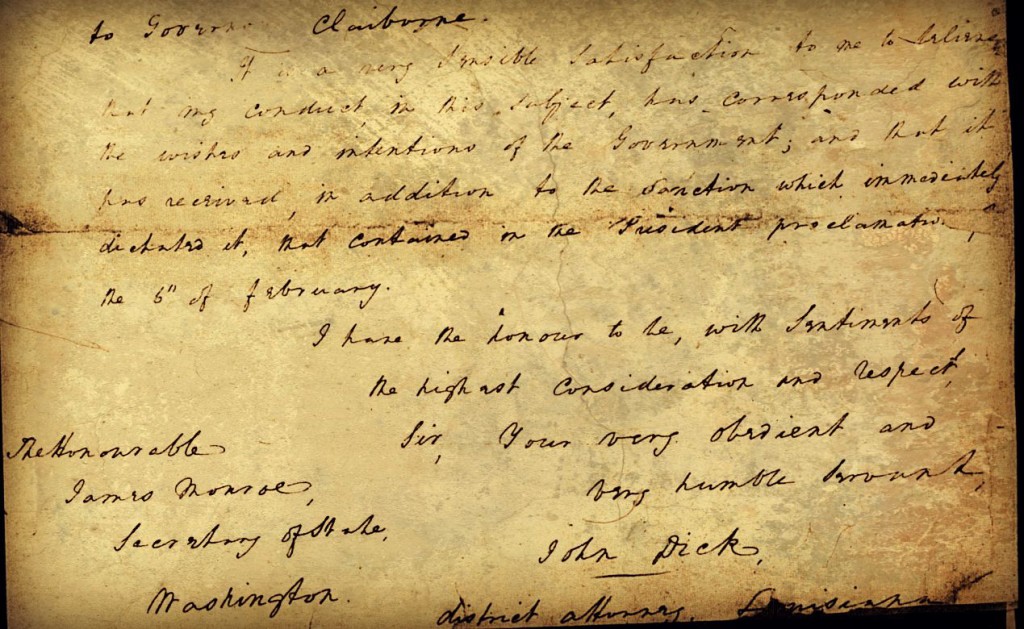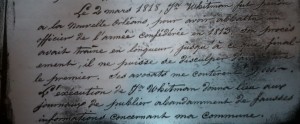John Dick’s Letter To Monroe Honoring the Baratarians
August 4, 2015 in American History, general history, History, Legal History, Texas History
John Dick, US District Attorney for Louisiana in 1815, was a man with a conscience, a strong devotion to what was fair and just, even when it conflicted with an earlier opinion that he had fostered. He had a keen sense of respect for those who had earned special consideration, like the Laffites and the Baratarians with their service and supplies in the battles against the British below New Orleans.
Even after President James Madison gave a blanket pardon to all the Baratarians who had served, Dick wanted to make sure that the powers that be in Washington knew exactly the extent of the privateersmen’s help, so he sat down at his New Orleans desk on March 17, 1815, and wrote a letter detailing the events to Secretary of State James Monroe.
It is nothing less than astonishing that Dick wrote about the Baratarians at all, considering when he had been a practicing attorney earlier, they had been thorns in his side in courtroom battles, to the extent that a man of lesser character would be loath to praise at all those from the “Isle of Barataria.” Dick had, after all, been the attorney for Commodore Daniel T. Patterson and Col. George T. Ross in their court actions the fall of 1814 for proceeds from ships and goods seized during the US raid against Grande Terre of September 1814. Moreover, Ross was Dick’s best friend.
Plus during that same fall of 1814 as the winds of war blew toward New Orleans from Great Britain, Dick had grown so exasperated by the actions of former district attorney John Grymes who had chosen to represent the Baratarians, that he openly insulted Grymes by accusing him of having been “seduced out of the path of honor and duty by the bloodstained gold of pirates.” Grymes responded by challenging him to a duel, in which both were wounded, Dick with a shot to one thigh, and Grymes with a shot to one calf.
Thus not only had Dick been against the Baratarians in court, he had even been wounded in a duel because he had insulted their attorney!
So why did Dick write to Monroe in favor of the Baratarians in March of 1815, most particularly since his friend Ross had just left New Orleans for Washington to petition Congress for monies acquired from the raid on Barataria? At the time, the Laffites were seeking restitution of these same monies in New Orleans court.
Dick heard the Laffites and Baratarians’ side in the court system,and although he took no action in New Orleans in their favor, he deliberately wrote to the secretry of state and went against the stance of Ross, who had just left New Orleans for Washington to petition Congress for monies acquired from the September 1814 US raid on Barataria. The district attorney obviously thought Ross’ motives for profiting off of the raid were personally unsettling, and wanted Washington to know the truth, least that truth be lost in the flurry of post-battle self-aggrandisements among others who had served with Major General Andrew Jackson at the plains of Chalmette. It reflects great resolve on Dick’s part that he took such an action considering he had a permanent limp from that duel he had fought regarding his insult to the Baratarians’ lawyer just a few months’ previous.
Dick’s letter to Monroe, now in the National Archives, came to light some 200 years later during a search for another research topic. Daniel Preston, editor of the wonderful annotated Complete Catalogue of the Correspondence and Papers of James Monroe (2001), kindly made a full copy of Dick’s letter available.
Dick begins his letter by acknowledging receipt of a letter from Monroe of Feb. 8, 1815, along with a copy of James Madison’s presidential pardon of the Baratarians.
“The measures which have already taken place with respect to some of the persons connected with the association lately existing at Barataria, and the reasons and authority upon which these measures were founded I should like the liberty to lay before you__
At the period of the late invasion of Louisiana, when the danger was imminent, and it had become necessary to call forth the whole means of the state to repel the invaders, strong appeal was made to Majr. General Jackson by the individuals composing the French volunteer companies on behalf of the Baratarians then in confinement. (Ed. Note: these men were taken during the Sept. 1814 raid on Grande Terre, Barataria, by the US forces under Patterson and Ross) These companies formed the most efficient force of the city, and they had, on this occasion, displayed great zeal, and manifested dispositions highly patriotick (sic). It was important that this spirit should be fostered and extended and no circumstance, it was imagined, could contribute more to these desirable ends than a compliance with the wishes thus expressed. [The Baratarians], although culpable, were brave, skilfull, and enterprising, and their associates were numerous, and their connexions (sic) extensive; it was felt, that, if to be depended upon, their personal exertions might be eminently useful, while their ardour and example would inspirit (sic) others.”
Dick continued that for the Baratarians’ conduct and reliability, “we had the assurances of a large and respectable portion of the community, guaranteed by their own national antipathies, domestic feelings, and private interests.”
After the state legislature passed a resolution along the same views as the French volunteers, Dick said on Dec. 18, 1814, everyone in confinement with offences “growing out of the unlawful association at Barataria” were freed.
“I need not say that the conduct of these men (Baratarians), throughout our late arduous and distinguished struggle, did not violate the confidence that was thus reposed in them. The commanding general has noticed their services,, and has done justice to them notwithstanding their circumstances.”
Dick said when he took office as district attorney in February 1815, he faced an unpleasant quandary as he felt it incumbent upon himself to prefer indictments upon presentments of the grand jury against the Baratarians, and it would have meant re-imprisoning those who had just served to help win the Battle of New Orleans. Dick wrote Monroe that such a move by the courts would have excited discontent in the community re the Baratarians “whose gallantry and patriotism had won the highest praise, and who deserved favors and indulgence even in their mistaken sympathies and opinions.”
He went on to say that he was “relieved from the embarassment arising from this apparent conflict of duty with policy and justice by the permit of a letter from the Attorney General of the United States addressed to his excellency Governor Claiborne, in relation to the Baratarians,which worked very satisfactorily and unequivocably, a disposition to lenity on the part of the President, even before the latter inducements to it existed.”
With such assurances of policy, Dick declared nolle prosequi in nine cases, including those of the Laffites and Dominique Youx, for offences growing out of the “unlawful establishment at Barataria.” (Nolle prosequi is the abandonment by a prosecutor of all or part of a suit or action in court.)
“It is a very Sensible Satisfaction to me to believe that my conduct in this subject has corresponded with the wishes and intentions of the Government; and that it has received, in addition to the sanction which immediately declared it, that contained in the President’s proclamation of the 6th of February,” Dick concluded.
A couple of weeks before Dick wrote his letter, and after the Baratarian indictments were dropped, Ross left New Orleans in March 1815 for Washington, D.C. to petition Congress with the help of a Congressional friend for the monies from the Barataria raid. The bill for the relief of Ross and Patterson was read for the first time in Congress on April 1816, a month before the sickly Ross died at a relative’s home in Pennsylvania. Jean Laffite went to Washington, too, but not until December 1815, when he wrote a letter to President Madison on Dec. 27 seeking recovery of the raid monies. Madison’s response is unknown, but at that time, he was not in Washington. On Feb. 22, 1817, President Madison signed into law an amended bill supported by Congress that directed the secretary of the treasury to pay Ross and Patterson $50,000 from the proceeds of the Barataria raid. It was, of course, too late for Ross. In his will, Ross directed Dick to see that the sum granted him from Barataria was paid to his wife and children in New Orleans, but proof that that happened is non-existent.
Dick quickly turned about once more in his estimation of the Baratarians and Laffites following the afterglow of the Battle of New Orleans, mostly due to piratical actions in the spring of 1815 by one of Laffite’s men, Vincent Gambie, who had been wounded in fighting on Jan. 8, 1815. He was unsuccessful in bringing Gambie to justice due to sympthetic jurists, but in late 1817 Gambie’s own men beheaded him with an axe following a dispute over money.
In 1819, prompted by an increasing turn of New Orleans public sentiment against the Laffites at their new base at Galveston, and the US capture of the Laffite’s newly acquired ship Le Brave after it seized a Spanish ship carrying American cargo near La Balize, Dick successfully brought piracy charges against the captain and crew, the first time a Laffite ship had officially been found guilty of piracy. The captain and most of the crew were hanged in 1820, not long after the Laffites abandoned Galveston.
Dick married Mary Farar of Laurel Hill near Natchez in January 1820. By November of the same year, she died along with their stillborn child and her mother at the Dick’s vacation home at Bay St. Louis, victims of yellow fever. Dick also had it but recovered. Grief-stricken, he resigned his position as US Attorney and moved out of his opulent New Orleans house as it bore too many memories of his wife. However, US District Judge Dominick Hall died the next month , creating an opening, and President Monroe appointed Dick federal judge in New Orleans in 1821. In 1823, he married his first wife’s second cousin, Frances Ann Kenner. Their marriage would not last long. John Dick died April 23, 1824, of consumption.
In one of the strangest twists of the John Dick story, although he had felt the Baratarians deserved better treatment after their role in the Battle of New Orleans, he did not feel so warm-hearted to Jackson at the time, possibly due to his unconstitutional use of martial law in New Orleans, and the incarceration of Judge Hall. As soon as peace was declared, Dick indicted Jackson on charges of obstruction of justice for imprisoning Judge Hall when he had charged Jackson with contempt of court. When Jackson appeared in court for the indictment, he refused to answer interrogations, received a fine of $1,000, paid it and left the court, carried away by a cheering crowd of Baratarians. Years later, Jackson remembered Dick as his “sworn enemy,” but Dick actually revered Old Hickory. In his will, Judge Dick left a personal library which included four portraits on the walls, depicting George Washington, President James Monroe, Napoleon, and Jackson. Dick was a complex man with mutable ideals.
.


Recent Comments